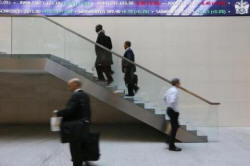|
 Global
stocks succumb to growth fears; ECB trillion euro question awaits Global
stocks succumb to growth fears; ECB trillion euro question awaits
 Send a link to a friend
Send a link to a friend
[October 02, 2014]
By Marc Jones
LONDON (Reuters) - World stocks and oil
were knocked hard on Thursday after global manufacturing data and an
Ebola health scare in the United States spooked markets, sending
investors scurrying to the safety of U.S. bonds, the yen and gold.
|
|
 European markets had been sucked into the storm, anxious about the
European Central Bank's monthly meeting where it is under pressure
to launch an aggressive government bond purchase program to revive
the euro zone's stodgy recovery. European markets had been sucked into the storm, anxious about the
European Central Bank's monthly meeting where it is under pressure
to launch an aggressive government bond purchase program to revive
the euro zone's stodgy recovery.
Investors flocked to the yen and safe-haven bonds following a slew
of surveys on Wednesday that had shown German factory activity
shrinking for the first time in 15 months, China's manufacturing
sector barely growing and the United States slowing more than
expected.
Confirmation of a case of Ebola in the United States joined a
growing list of bearish news stories, with geo-political tensions in
Ukraine, the Middle East and Hong Kong, and growth concerns around
China and the euro zone sapping risk appetite.
All that pushed MSCI's 45-country world stock index to a five-month
low as a fourth day of back-to-back falls left it down more than 5
percent in the last month.
There was little sign of the rout coming to end in Europe either.
Britain's FTSE, Germany's DAX and France's CAX saw 0.3-0.6 percent
falls while Italy and Portugal were down more than 1 percent.

"The market is quite nervous," said Alvin Tan, a strategist at
Societe Generale in London.
"What we are most concerned by is the risk backdrop. The S&P 500
appears to be in the process of breaking below the 100-day moving
average and on top of that we see volatility picking up in not only
equities but also currencies."
On top of all the geopolitical and growth concerns, markets are also
struggling with the fact the Federal Reserve is about to end years
of pumping billions of dollars of stimulus into the U.S. and global
economy each month.
After Wall Street had dropped 1 percent [.N] Japanese equities had
led the selloff in Asia overnight. A rebound in the yen after a
sudden loss of altitude for the high-flying dollar pushed Tokyo's
Nikkei down a sharp 2.1 percent to three-week lows.
TRILLION EURO QUESTION
Markets in both China and Hong Kong had been closed for public
holidays but sustained civil unrest in Hong Kong is also weighing on
investor confidence, although the city's streets were calm for most
of Thursday.
The risk-averse global mood had pushed 10-year U.S. Treasury yields
-- the benchmark for world debt markets -- into their biggest drop
in just over a year on Wednesday. They were steady at 2.4 percent in
European trading as German Bunds sat not far from all-time lows at
0.9 percent.
The dollar subsequently slipped back below 110 yen - a threshold
breached for the first time since 2008 this week. It was last down
0.3 percent at 108.61 yen and on course for its biggest drop in over
a month against major currencies.
The euro was a shade higher at $1.2638 having crawled away from a
two-year low of $1.2571 hit earlier in the week.
[to top of second column] |

Traders were focused on the European Central Bank meeting later in
the session with the divergence in U.S. monetary policy from those
of Europe and Japan now an established market theme.
ECB head Mario Draghi is set to give details at the bank's 1230 GMT
(0830 EDT) post-meeting news conference of a new plan to buy
asset-backed securities and covered bonds, hoping this will finally
revive the euro zone economy.
It hopes the plans will add a trillion euros to its balance sheet,
but poor demand for a new round of cheap loans last month is raising
the pressure for it too be more aggressive.
"In the longer term people are still hoping for full-scale
quantitative easing," said Robert Kuenzel, euro area economist at
Daiwa Securities in London.
"But it is unlikely to come in the near future. I think the first
line of defense is the TLTRO (cheap long-term loans to banks) and
the covered bond and ABS purchase programs, but there is a risk that
both of those components disappoint."
OIL PLUNGE
With the focus on damage limitation, gold added to small gains to
rise 0.5 percent to $1,219.27 an ounce.
In commodities though, Brent crude oil tumbled below $92 a barrel,
extending a three-month losing stretch as weak economic signals from
China and Europe and ample global supply continue to weigh.
It has now lost 20 percent since June and sharp cuts in official
selling prices from Saudi state producer Saudi Aramco on Wednesday
gave the clearest sign yet that the world's largest exporter is
trying to compete for crude market share.
"This is a structural change in the oil market, with Saudi Arabia
explicitly stating that they are willing to compete on price," said
Bjarne Schieldrop, chief commodities analyst at SEB in Oslo.

"I think Brent will fall below $88 before we see the bottom of the
market."
(Reporting by Marc Jones; Editing by Ruth Pitchford)
[© 2014 Thomson Reuters. All rights
reserved.] Copyright 2014 Reuters. All rights reserved. This material may not be published,
broadcast, rewritten or redistributed. |